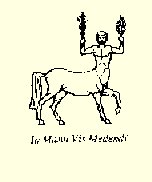 |
Chiropractic: An
Art & Science
Like people, animals suffer from back, neck, pelvic and musculoskeletal problems, and like
us, they can benefit from chiropractic manipulation. Tony Gilmore, Animal PRO for
the McTimoney Chiropractic Association explains. (31/7/99) |
 |
Green-lipped Mussel
Agility
is a physically demanding activity so do bear in mind that dogs can develop joint problems
whatever their age, size or breed. There is a complex natural product – green-lipped mussel -
which is said to be able to help protect areas prone to injury, and, at the same time, guard
against the normal wear and tear of the ageing process. |
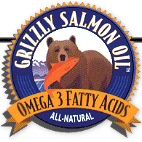 |
Grizzly Salmon Oil
Sara
Lloyd discovered fish oils for dogs after her Miniature Schnauzer Henry had been diagnosed with
cancer. At first he had responded well to the chemotherapy but later, when it failed, he would
be ill for weeks at a time following treatment. Sara knew that she had to find another way to
help him. And then she read an article in the American agility magazine Clean Run. |
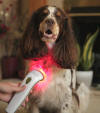 |
Home Use Photobiomodulation
When
vet nurse and co-founder of Awesome Paws Agility, Trish Helme, noticed worrying
changes in her five year old Working Cocker Epic, she immediately booked an appointment with
canine massage therapist Sarah Darling for an initial assessment. She wondered
if the process known as photobiomodulation could help Epic get back to the active sporting life she
loved. Sarah Darling of K9 Gait Massage explains what happened next. |
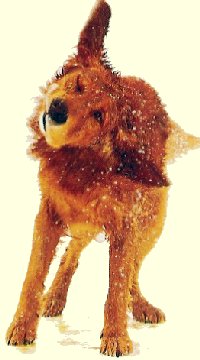 |
Hydrotherapy: In
the Swim
In any action sport,
whether it involves humans or animals, it is a well-known fact that the fitter the
participants are the less likely it is for injuries to occur. However, due to the foot and
mouth crisis, many agility dogs are losing their fitness from lack of off-lead running,
regular training and competitions. This will result in both dogs and humans sustaining
pulled muscles and other injuries when we can finally return to training/competing. With
this in mind, Sally Hopkins recommends a dip in the pool. (15/04/01) |
 |
Joint Aid
GWF Nutrition Managing Director Stephen Tucker
answers three of the most commonly asked questions on taking care of your dog's joints. |
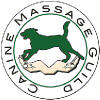 |
The Lenton Method®
Dog owners may seek out massage
therapy for their dogs for a variety of reasons which may include chronic
pain management, conditions such as arthritis, or to improve common movement
and mobility issues, e.g., lameness, slowing down, and stiffness. Just as
with humans, dogs have a complex anatomy and physiology and may have a range
of musculo-skeletal issues that only a highly skilled practitioner can
locate and treat. With off-the-shelf online courses readily available and
nothing to stop anyone calling themselves a canine massage therapist, what
education should dog owners look for to ensure that their precious pet is in
good hands? Virginia Harry reports. |
 |
McTimoney Animal
Therapy - A Case Study
McTimoney
therapist Anna Rowland has been treating Murphy since last April when Jo Bird brought him to
her for a back check as he is prone to problems. Poor old Murph has had his fair share of
problems, which is why Anna thought using him for a case study would make for interesting
reading especially for agility handlers! |
|
 |
Osteopathy: Put the Joy Back into Jumping
Most
dogs naturally enjoy agility, and when they feel restricted or unwell, they may not perform at
their best. Prompt of assessment of an injury following a tumble can save a great deal of
pain for both the dog and its owner, and regular check-ups for recent or longstanding problems
can avoid lameness, arthritis and back problems. Animal osteopath Julie Vaughan explains what
you can do when rest and painkillers are not enough. |
 |
Osteopathy - What to Expect
Osteopathy is a science in which the
practitioner interprets a wide range of diagnostic clues in the search for the underlying cause
of a problem. Claire Short could wax lyrical about neuro-muscular this or myo-fascial that, but
she's been told by her partner to stick to plain English, so that’s what she's done! Pay
attention. |
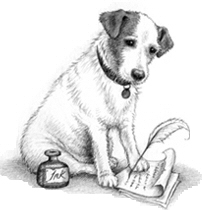 |
Reiki for Dogs
The
modern day domestic animal has a lot to contend with. The pressure of finding its natural
ground in what can be an unnatural environment for their species can sometimes prove too much.
The benefits of Reiki/healing for humans is well documented with over 150 studies showing
that it has a wide range of benefits but it can also have positive affects on dogs, affecting
them on a number of different levels. It can be useful in treating agility dogs as Jackie
MacCallum describes below. |
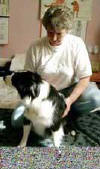 |
Shiatsu for
Agility Handlers & Dogs
Each
year Jean Davidson works her Shiatsu magic on new and returning handlers and their
dogs around the agility circuit in Scotland. She has noticed that quite a few of the dog problems
would seem to be related to the handler as well as the dog as if they were being transferred
down though an invisible lead. She explains how it works... |
 |
Shoulder
Injury in the Agility Dog
Is your dog suffering in silence? Shoulder
injuries are especially common in agility dogs. The symptoms they present and
the severity of the injury can vary, making it difficult to identify the
problem. Canine massage therapist Karen Young details some of the signs that indicate that your dog may be carrying a shoulder injury. She offers
one therapeutic solution to help them get back on course. |
 |
Smart Clinic
Many agility handlers
might have
wondered about the benefits of seeking professional advice on a competition dog that
didn't seem to have any perceivable problems. They might have questioned why Gemma Osmond felt the need
to have Ella checked over at the Smart Clinic when she had competed so successfully that year. It's simple really!
Gemma felt it made sense to consult the experts when it came to the health and well-being of
someone as important as her dog. |
|
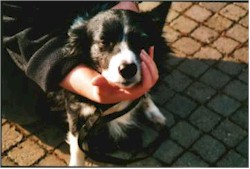 |
Sports Bras
Crufts,
once again, has brought dog agility to a wider audience and put it under increased scrutiny.
For those of you who were at the NEC or watched at home, there's a good chance that you might
have commented on some of the handlers as well as the dogs. Be honest. You can't deny that some
of the more 'traditionally built' ladies were attracting more attention than their four legged
companions. Selaine Messem of LessBounce is concerned that some of our larger ladies are
running without adequate support. |
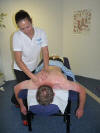 |
Sports Massage
When was the last time you had your dog
checked over by a massage therapist, chiropractor, osteopath or other? And now, when was
the last time YOU were treated or checked over? Tamzin Grimes is now offering a sports
massage service for agility handlers at shows. |
|
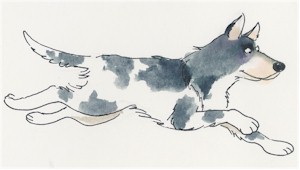 |
Strrr-etching the Imagination
It's all well and good to say that
you should warm up your dog before training or a competition but what does that really
mean? Some suggestions for warming up programmes which could be used before training or a
run at a competition. (11/11/02) |
 |
Tellington TTouch for
Agility
TTouch is a forward thinking approach to
training, handling and rehabilitation for all animals. Toni Shelbourne, one of the UK's top
practitioners, explains how it can help agility dogs.
(07/07/08) |
|
 |
TTouch for Agility
Touch your way to success with TTouch, a method of working
with animals to calm, focus and aid recovery. Jeanette Atkinson,
TTouch Companion Animal Practitioner and agility instructor explains why TTouch and agility
make such great partners. (25/02/02) |
 |
Vet Physio for the
Agility Dog
Chartered Physiotherapist Barbara
Houlding sent us this case study of Nicola Vince's first agility dog, Jess. |
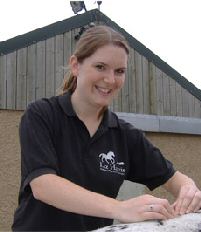 |
Warm Up & Cool Down
Agility dogs are often confined in the car or crate, and may
go straight into the ring with little or no advanced preparation. This inevitably
increases the risk of injury and also prevents dogs from performing at their best. Animal
therapist Liz Harris explains how you can prepare your dog for agility work and how to tell
if your dog needs to see a therapist. |
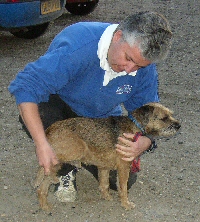 |
Warming Up for Agility
Paula Kingswood found Canine Massage & Stretching
while surfing the Net, hoping to find a way to prevent the same injury problems her terrier
incurred last year. She reports on the results which were not what she expected but were
nevertheless welcome. (16/05/05) |
|
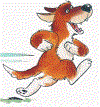 |
Warming Up -
Questionnaire
As
a Chartered Physiotherapist and
agility handler herself, Lesley Holmes has always been surprised that so few competitors appear
to warm-up their dogs before a run. Human athletes like Linford Christy and David Beckham do so
why not our canine athletes? As part of her studies for a MSc in Animal Physiotherapy,
therefore, she decided to combine her academic studies with her own particular interest. So she
devised a questionnaire to find out
whether
'warming up' reduces injuries to
agility dogs and circulated it around
the agility community. The results have now been analysed and she's
agreed to share the results, in précis form, with you here. |